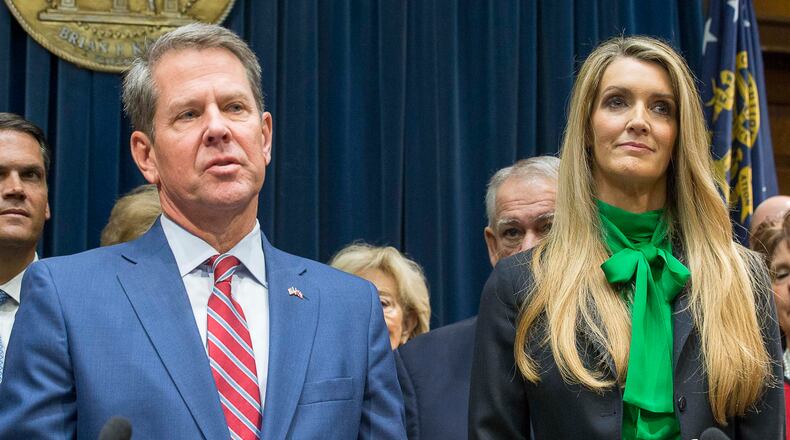Georgia Gov. Brian Kemp signed into law a ban on donations to county election offices Wednesday, making it a felony for local governments to accept money from nonprofit organizations that gave millions of dollars during the 2020 presidential election.
Limiting outside election money became a priority among Republicans in Georgia and across the country after the Center for Tech and Civic Life, which was funded by Facebook founder Mark Zuckerberg, contributed more than $400 million to election offices nationwide during the first year of the coronavirus pandemic. About $45 million of that money was given to local election offices in Georgia.
Georgia is the 24th state since the 2020 election to adopt a law to prohibit, limit or regulate private funding to run elections, according to the National Conference of State Legislatures.
“Senate Bill 222 builds on previous law to ensure that our election operations are never bought and paid for by partisan or special interests,” said former Republican U.S. Sen. Kelly Loeffler, founder of the voter registration organization Greater Georgia. “This critical measure levels the playing field for election boards across our state and safeguards them from outside influence.”
Voting rights groups and Democrats said the ban will lead to underfunded elections and longer lines unless county governments spend more taxpayer money to accommodate high turnout.
“Further restricting necessary external funding because Republican lawmakers in Georgia refuse to adequately resource our electoral system is anti-democratic, plain and simple,” said Stephanie Jackson Ali, policy director for the New Georgia Project Action Fund, a voter registration group.
Most of the money donated by the Center for Tech and Civic Life in 2020 went to Democratic-leaning counties, but several Republican areas also received grants. The money was used to pay, among other things, equipment to process mail ballots, protective gear for election workers, election staffing, absentee ballot postage costs and voter outreach.
The GOP movement to restrict nonprofit elections donations gained steam this year after DeKalb County, a Democratic stronghold, received a $2 million grant in January from the U.S. Alliance for Election Excellence, whose members include the Center for Tech and Civic Life.
Under the legislation, DeKalb will be able to keep the $2 million grant, which was previously allowed under state law.
But any county government official who accepts future outside money could face felony charges punishable by at least a year in prison and a $10,000 fine.
The restriction on election funding, which passed the General Assembly along party lines, is the latest change to state election laws since 2020, when Republican Donald Trump lost Georgia to Democrat Joe Biden by less than 12,000 votes.
The Republican-led General Assembly approved a broad election overhaul the following year that limited absentee ballot drop boxes, required absentee voters to provide additional ID, allowed state takeovers of county election offices and banned handing out food and drinks to voters waiting in line.
That law, Senate Bill 202, also curtailed nonprofit contributions but didn’t shut them off entirely. It prohibited direct contributions to county election offices while still allowing county governments to solicit grants on their behalf, as DeKalb did in January. This year’s legislation closes that loophole.
Contributions will still be allowed to the state government, which could then decide how to distribute funding among counties.
About the Author
Keep Reading
The Latest
Featured




